Assoc. Prof. Ömer Yılmaz, Massachusetts Institute of Technology
Ömer Yılmaz is an Assistant Professor of Biology at the Koch Institute for Integrative Cancer Research at MIT and a gastrointestinal pathologist at the Massachusetts General Hospital and Harvard Medical School. He is a graduate of the University of Michigan Medical School, where he performed his thesis work under the guidance of Professor Sean Morrison. He has also spent two years as a visiting Postdoctoral Fellow in the laboratory of Professor David M. Sabatini, a member of the Whitehead and Koch Institutes. In 2014 he established his lab, which focuses on understanding how adult stem cells and their microenvironment adapt to diverse diets in the context of tissue regeneration, aging, and cancer initiation. His achievements, to date, have been recognized with a Harold Weintraub Award, Pew-Stewart Trust Fellowship, Sidney Kimmel Fellowship, and a V Scholar Award.
Research Focus
‘Relationship of Intestinal Stem Cells with Metabolism and Nutrition’
His research reveals that calorie restriction (CR) enhances ISC function through mTORC1 signaling, while a high-fat diet increases tumor formation by affecting ISCs and progenitors. Dr. Yılmaz aims to uncover the molecular mechanisms behind these dietary effects to develop diet-based strategies for tissue regeneration and cancer prevention. By better understanding how intestinal stem cells adapt to diverse diets, he aim to identify and develop new strategies that prevent and reduce the growth of cancers involving the intestinal tract that includes the small intestine, colon, and rectum.
Key references
- Dietary and metabolic control of stem cell function in physiology and cancer. Mihaylova, MM, Sabatini, DM, Yilmaz, ÖH. 2014. Cell Stem Cell 14, 292-305. doi: 10.1016/j.stem.2014.02.008
- In vivo genome editing and organoid transplantation models of colorectal cancer and metastasis. Roper, J, Tammela, T, Cetinbas, NM, Akkad, A, Roghanian, A, Rickelt, S, Almeqdadi, M, Wu, K, Oberli, MA, Sánchez-Rivera, FJ et al.. 2017. Nat Biotechnol 35, 569-576. doi: 10.1038/nbt.3836


